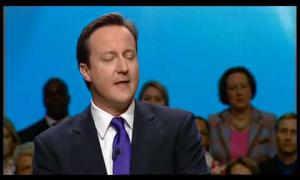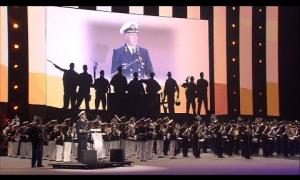“Laugh as much as you can because there will be plenty of moments to make you cry”
May 14, 2010
Rumor has it that this would run four hours and 20 minutes. I polished it up and got it down to four hours and ten minutes, but I can do it in 15 minutes, unless I see somebody snoozing. If I see somebody snoozing, I’ll stretch it out!
Thank you, Dr. Waldner and Mr. Kinsley, for that generous introduction—I should just shout go Spartans and go home!
Each of you graduating today has much to be thankful for:
First of all, give thanks for having been born an American or having immigrated to this country.
And, be especially thankful for having attended York College of Pennsylvania. As you graduate today, you do so knowing that over 90% of York College graduates find employment in their chosen careers—a statistic in which, were I you, I would be vitally interested, especially in today’s challenging economy! And it is particularly noteworthy that about half of the 5,000 students here receive scholarship aid in an amount exceeding eight million dollars annually. Therefore, it is easy to see why it is so important for each of you to “give back” to your Alma Mater each year beginning this year—even if it’s only ten bucks—get in the habit early.
I am extremely selective determining my life heroes, but on that very short list is Winston Churchill, who is purported to have said, “We make a living by what we get; but we make a life by what we give.”
Of course my hero also had a famously quick tongue—one of my favorite stories is that at a dinner party the following exchange is purported to have taken place:
A lady sitting across from Winston said, “Winston, you are drunk.” Winston’s instant reply was, “Yes, Madam, I am drunk—and you are ugly—but tomorrow I will be sober.”
I have an abiding respect and affection for York College. My elder son, Scott, was the president of his senior class before graduating from here with his now wife, Rebecca, in 1981.
I know that a commencement speaker is supposed to impart wisdom. And if I have any to give, it partly comes from lessons that were learned by me in ways that I clearly would not have chosen, but which I have come to accept. We all need to learn from our experiences.
“God does all things for good and with deliberate purpose”
Was my mother, Ida Mae, right in her ardent belief in this Biblical paraphrase?
My life changed forever about 3:30 p.m. on April 17, 1999. I was riding my good Irish horse, Emerald Action, in the Grand National Timber Steeplechase Stakes at Butler, Maryland. He ran and jumped brilliantly, and was leading as we approached the 16th of 18 fences, when the horse I knew we had to beat, Welter Weight, came along side.
I can only assume that Action was distracted by the presence of Welter Weight, because the always reliable Action arose to the unbreakable stakeâ€andâ€bound fence only at the last moment. Then a half ton of horse, traveling at 25 or so miles an hour, came down heavily, throwing me to the right side of my face, and breaking the C5/6 vertebrae in my neck.
I remember little after the fall–just that I was paralyzed and could move neither my feet nor my legs, my arms nor my hands. It seemed hours before I was transported, first by an ambulance and then by a helicopter, to the shock trauma medical unit of the University of Maryland Hospital. You cannot predict life’s vicissitudes; you can only prepare. But nothing could have prepared me for what I saw on being turned face down on a revolving gurney. Lying directly in front of me were both my organ donor commitment card and my living will.
Throughout the next couple of months, I did regain some of the use of my arms, but progress ended there. Over the next few years doctors in Cleveland and Baltimore operated several times on my hands, but to little avail.
Upon returning home about July 15, one of my first acts was to review my estate plan post injury. It was fine for a 64â€yearâ€old entrepreneur who never deferred to age, but it required adjustment to accommodate my new life in a wheelchair. Quite frankly, the asset appreciation since the creation of my first company in 1960 astonished me. About a third of my commercial worth was in Snow Time, Inc., a threeâ€ski area holding company which I started with the first ski area, Roundtop, in 1964; about a third in Corâ€Box, a corrugated box company which I started in 1968; and about a third in real estate, consisting of a small industrial park and several farming and industrial and commercial properties. I concluded that I should sell one of these three holdings. I loved the ski business and knew it better than corrugation, which I developed more as a financial than managerial owner. And to sell the real estate may have taken more time than I thought I might have. Therefore, I made the decision to sell Corâ€Box, which I did in November of 1999. After a tax reservation, I still had more than my perceived needs. Over the next few years I sold all of the real estate that I wanted to sell. Then I was ready to take on the larger challenge I faced.
I turned my interest, instincts, and intellect toward a cure for my paralysis. It wasn’t long before I began to recognize stem cell research as my best hope—and the best hope for others like me. I met Dr. Jose Cibelli, a pioneering scientist to whom I took an instant liking. I became mesmerized by his work: his brilliance was fascinating; his optimism contagious; his charm disarming.
Shortly thereafter Jose and his work moved to Michigan State University. We stayed in touch. He confided in me that his work at MSU could move faster with an increase in his financial resources. President Bush’s restriction on embryonic stem cell research was not helpful. I asked Jose to send me a threeâ€year budget and business plan; he did and, upon my review, I told him that I approved the plan, but that I would need a 50% partner for the budget. It took us only two weeks to find a suitable partner. After a few days of phone negotiations, a state representative and I agreed that Michigan and I would equally fund Jose’s team to meet the aggressive timeline of three years, instead of the originally planned five years. Jose understood that persistence and determination would be required to accomplish our goal in the shortened timeline – just as you will discover as you morph from student to employee, entrepreneur or professional. Always remember: persistence and determination alone are omnipotent in accomplishing your goals.
Jose’s first goal was to create DNAâ€specific embryonic stem cells through his patented process called “dedifferentiation.” He and his team were able to convert my skin cells back to their embryonic stage; this process allowed for the production of embryonic stem cells without killing the embryo. This overcame the objections of those who found the use of human embryos for this purpose morally objectionable. For cell therapy, these are uncharted waters, but our plan is to obtain both European EMeA and US FDA approvals before having my newly reprogrammed cells injected into the location of my C5/6 injury.
But the downsides are serious: death or cancer, although neither is likely, or a tumor which can probably be excised. Actually, my primary fear is pain. I am always uncomfortable now, but I have no chronic pain. I have a friend in Baltimore with an injury similar to mine, also created by a horseback riding accident, and he is in intermittent chronic pain. I think of him every day. But fear pales in the face of hope–and my hope is to be the first person with my paralysis condition to walk from a wheelchair. And then millions worldwide will follow me from their wheelchairs.
Hopefully, by Spring 2011, I will be walking in the May sunshine among the green pastures and brilliant flowers and buds on our Maryland horse farm.
Had Mother been Catholic instead of Lutheran, I suspect by now she would be on the saint’s short list. She was the most loving, patient, caring and wholesome woman imaginable. And one of her mantras was that “God does all things for good and with deliberate purpose.” I’m glad she wasn’t there to see me break my neck, and I’m glad she hasn’t seen my struggle as a quadriplegic. She joined our deceased relatives in 1983.
But was it God’s plan that I break my neck, sell Corâ€Box, meet Jose, contribute to his stem cell studies and help with a cure for paralysis? Only God—and now, perhaps Mother—knows the answer to that haunting conundrum.
Whether I am successful in my personal goals, I hope that my experience can help send you out into the world better prepared to face your challenges. And that leads me back to my role here: There probably has never been a commencement address without the salutation “Go Forth.”
My “go forth” commandment to you is one word, generally used as an adjective and which I am sure each of you now paragons of educational brilliance will know. The word is salubrious, generally used as the adjective to describe longâ€term health—such as “salubrious habits.”
So my salubrious comments to you is to create a healthy life include the following without order of priority:
Take care of yourself—oneâ€third of America is obese—not fat—obese. Watch your diet and exercise. Trust me—your good health makes 90% or more of life’s pleasures possible. Your mind is important, but it is best served when housed in a healthy body.
Have a great amount of fun with your dating and romancing but marry someone you really like and who makes you laugh. And raise kids, be active in the community and, according to statistics, you’ll live a longer and happier life.
Live large, remember it’s not how long you live, but how well you live. Have courage. Form your own core values and have the courage to stick with them even when inconvenient and when peer pressure may tempt you away from them. Embrace trust.
Weed your social garden. Cultivate those few treasured friends who genuinely enrich your life. Enjoy the journey. Get out of your comfort zone. Travel—there’s nothing like travel to broaden your social and economic understanding.
And in each situation you face, carefully assess the risk, and then be prepared to accept the consequence.
You are just graduating. You, here in this fertile cradle of American academia, here in this castle of learning; you are the cream. Be proud of your past and confident in your future. This isn’t the end of your education; the educational journey is just beginning—which is why we call this ceremony a “commencement,” a going forth.
So “go forth” and enjoy your salubrious life and remember to laugh as much as you can because there will be plenty of moments to make you cry.
Thank you.



